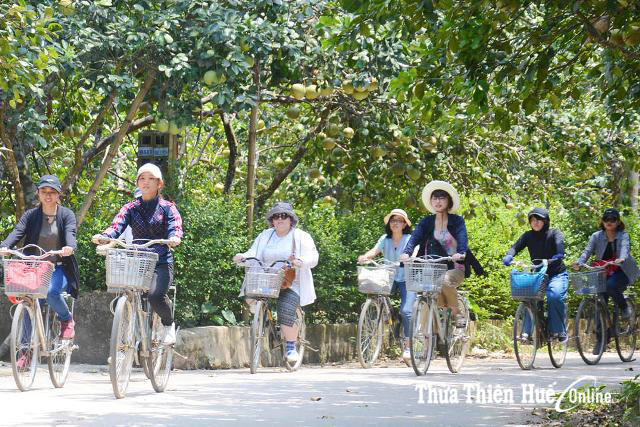
Visiting fruit gardens in Thuy Bieu where the village culture is still maintained. Photo: Dai Nhan
Teaching Vietnamese to Western people
Though starting community based tourism not long ago, every month, Xuan Dai Garden House at Nguyet Bieu Village welcomes hundreds of visitors who come for sightseeing and experiencing new things.
We stopped by once while the garden house owner was welcoming guests and found it exciting that he rarely spoke English though he could. "Xin chào, đây là mẹ của mình và đây là ba," ("Hi, this is my Mom and this is my Dad,") Mr. Viet Nam, a member of Xuan Dai Garden House said to visitors. "Visitors here have to speak Vietnamese. I teach them everyday Vietnamese. It's ours, and they like it," Nam told us his secret in community based tourism.
When lunch was served, Nam introduced the food in Vietnamese too. "Đây là cá. Đây là vả. Đây là bánh tráng..." ("This is fish. This is fig. This is rice paper...") That way, along with the tour guide, Western diners enjoyed spelling out each dish of Hue in Hue accent. The meal got started when the vocabulary lesson finished. It seemed that after the introduction with lots of laughs and smiles, simple and familiar dishes of Thuy Bieu Village had a deeper impression on them.
Showing guests how to eat fish... with bones
Another time, we went to Xuan Dai Garden House when the owner, Mrs. Bach Yen, was cooking for guests. On the charcoal fire was the pot of stewed carps, just like the common dish for locals. "This kind of fish is packed with bones; how can Westerners eat it?" I asked with curiosity. "I'll show them how to eat fish with bones then," revealed she.
Long ago, when Phuoc Tich Ancient Village (Phong Hoa, Phong Dien) began to receive visitors, at a meeting, the tour operators advised homeowners to make dishes without bones, especially fishbones, because Westerners cannot eat due to differences in culinary culture.
This time I decided to linger on to see how Mrs. Bach Yen would do it. Pointing at the fish dish well displayed on the tray, she said a few words about how carps were kept in the Perfume River and that that kind of fish had lots of bones. Then the host instructed guests how to eat it carefully so as not to be choked on fishbones.
The diners looked very attentive. After that they carefully experienced the new culinary skill. For them, it was probably the most exciting skill ever learnt in Hue. After the trip, many visitors wrote on the internet that eating fish with bones was an interesting experience of the culinary culture of the new land.
Never letting identity die out
At a conference on tourism long ago, experts recognized one of the tendencies in the "smoke-free industry" is community based tourism. Local culture including food, customs, natural scenery, etc. is tourist specialty.
However, experts also warned that the cultural interaction in the process of developing tourism with adaptability will weaken, or worse, deprive the local cultural identity.
The above-mentioned situation poses an important requirement for community based tourism. It is the orientation for development, so that the identity is not dissolved.
And the cultural identity will not be lost if people involved in tourism do understand its value to preserve and promote as the owner of the Xuan Dai Garden did.
Story by Tieu Muoi